Movie Review – Lawrence Of Arabia
Principal Cast : Peter O’Toole, Omar Sharif, Alec Guinness, Anthony Quinn, Jack Hawkins, Jose Ferrer, Anthony Quayle, Claude Rains, Arthur Kennedy.
Synopsis: A discontented young British solder is sequestered to the company of an Arabian King for the purposes of utilizing his forces in against the Kaiser during World War I. Along the way, the warring clans of Arabia are brought together in unity for the first time ever, thanks to the passionate preaching of young Lawrence.
*********
Still a miracle.
Much like Citizen Kane, some films defy criticism and the weight of a legendary legacy to remain among the very best of their art-form ever made. Sitting at my computer after a recent re-screening of this film, and still shaking my head in utter astonishment at the power the film continues to exude some half-century after initial release, it would be easy to think a review of a film this brilliant might very well write itself. Sadly, this isn’t the case, and so I thrust my fingers upon the keyboard in the vain hope of cobbling together enough rational thoughts to make some sort of sense – at least to impart a little of the wonder of this film to anybody reading who may not have seen it yet. Hollywood history is littered with the corpses of bygone epic films that have not stood the test of time; only a select few remain easy to identify to all but the most ignorant film lover. Ben Hur, Bridge On The River Kwai, Sound Of Music – such films were designed by Hollywood to combat the increasing pervasiveness of television, which was a fairly new invention back in the 60’s. Massive budgets and vast, sweeping storylines captivated audiences and dragged them back into the cinema to see these adventures on massive screens, the kind of storytelling only Hollywood could really deliver. Lawrence Of Arabia, perhaps moreso than any of the other films I just mentioned, is the most accessible of any of the big-budget event films of the era, in terms of anybody being able to appreciate and enjoy it. Even Steven Spielberg, in his assessment of it, labelled it “a miracle of a film”, and never more an apt description of Lawrence Of Arabia has been made.

For those of you reading this who haven’t seen Lawrence Of Arabia, I’m not going to chastise. It would be easy to sit here and deliver a sermon on how real film fans should have already seen this, but truth be told, not everyone has, and for younger film-lovers who came in late, then now might be an opportunity to go out and see this amazing, amazing film. If by writing this review I can provoke at least one person to go out and see Lawrence, then that’ll be a review worthwhile. Suffice to say, if you are among the number who haven’t seen Lawrence Of Arabia yet, and see it sitting there on Netflix, blinking at you, then can I implore you to do yourself a favour, set aside half a day, and give this monster a shot? I think you’ll find it’ll be worth your while.
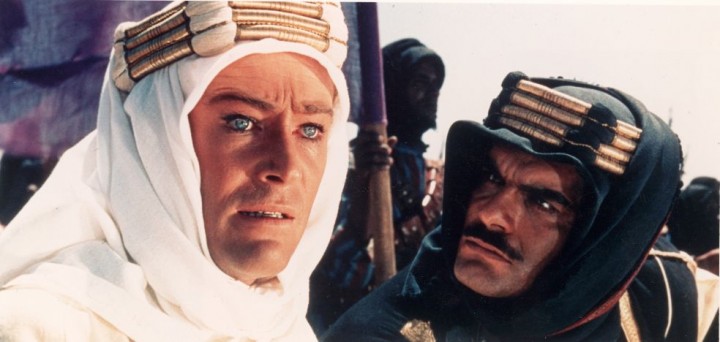
Lawrence Of Arabia tells the story of a young British solder, T.E. Lawrence, played in his debut role by Peter O’Toole, being sent to Arabia in a role designed to keep him out of the Great War by his superiors. Lawrence is ordered to meet with King Faisal (Alec Guinness) and update the British on the Arabian king’s battle with the Turks (whom the British are fighting elsewhere in Arabia). Faisal takes Lawrence under his wing, so to speak, and before long, the warring tribes of the desert Bedouin are united against a common enemy, thanks to Lawrence’s persuasive thinking and badgering of his new friends. A massive battle against a town held by the Turkish forces sees the Arabian allies victorious, although Lawrence encounters a degree of ambivalence to his success upon returning to his commander. Re-ordered to wage a guerrilla war across the desert, thanks to the British funded armaments he and his Arab allies have been given, Lawrence finds himself the subject of a war correspondent, Jackson Bentley (Arthur Kennedy), and his high profile ensures a massive propaganda win for the British. As he slowly becomes more Bedouin and less “English”, Lawrence begins to feel the pressure of the change in moral code impact on his mind – Lawrence becomes more like the men he fights alongside instead of those he fights for.
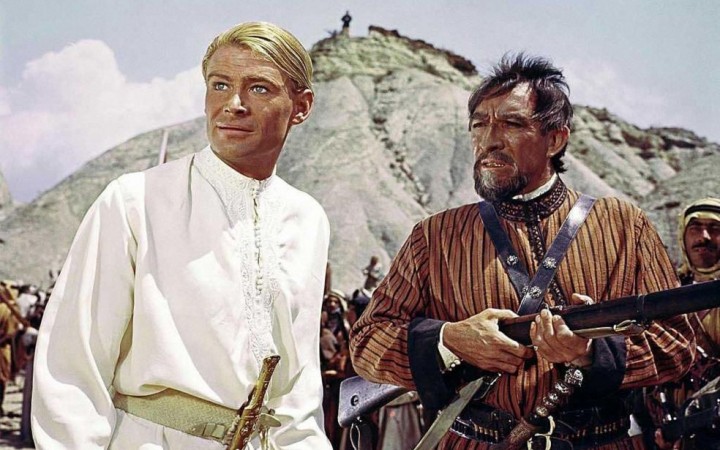
Where to begin with this one? I’ve tackled some amazing films on this website in the years since we first began, and I’ve usually managed to cobble together thoughts of a generally coherent nature for folks to read. Writing a review for a film like Lawrence Of Arabia, however, is the film lovers equivalent to dissecting and offering constructive criticism of the Bible. This film is almost impossible to criticize in any new way, and who am I to even really try? There’s so much good stuff here, from the all-round cast performances and the stunning (let me reiterate, stun-ning) location photography, and Maurice Jarre’s haunting, sweeping score. David Lean is a director renowned for his epic films, such as Bridge On The River Kwai, Dr Zhivago, and Ryan’s Daughter. With Lawrence, he completely captured the epic nature of the real man’s journey across the deserts of Africa, and into folklore and legend.
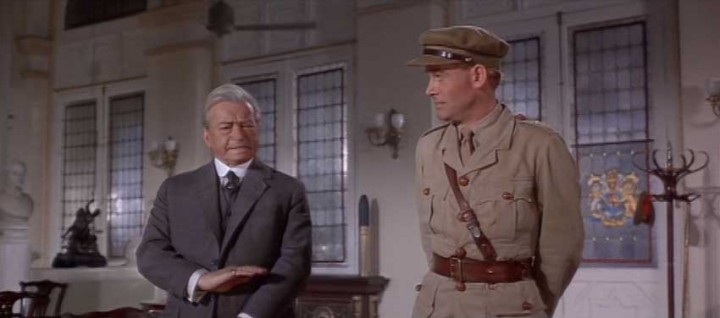
The film begins with the depiction of Lawrence’s death. Killed in a motorcycle accident, Lawrence was lauded at the time (in 1935) a both a war hero and a figure of considerable controversy, intimated during a post-funeral confrontation between attendees; the film then occurs as a flashback to Lawrence’s early days in the British army during World War I, stationed in Cairo. Lawrence is a somewhat insolent character, and through this is given the unwanted mission of going into the desert to meet up with British ally, Prince Faisal, to assess his ability to assist in the war effort. The script for Lawrence, written by Robert Bolt and Michael Wilson, is stuffed full of subtext and information, the kind of script which invites scrutiny for not only what it covers, but what it omits – by design or accident. According to internet research, the film is controversial for its depiction of Lawrence as something of an egotist, showing him with a rather arrogant attitude to those of “small minds” around him – his distaste for the more violent and capricious nature of the Arab peoples is noted particularly early, and much has been made of this portrayal of the man by O’Toole. Whether this is incorrect or not never really matters to the movie (although purists might disagree), rather it serves a purpose within the story, acting as a catalyst for Lawrence’s dramatic change in personality and ethical stance towards the climax late in the movie.
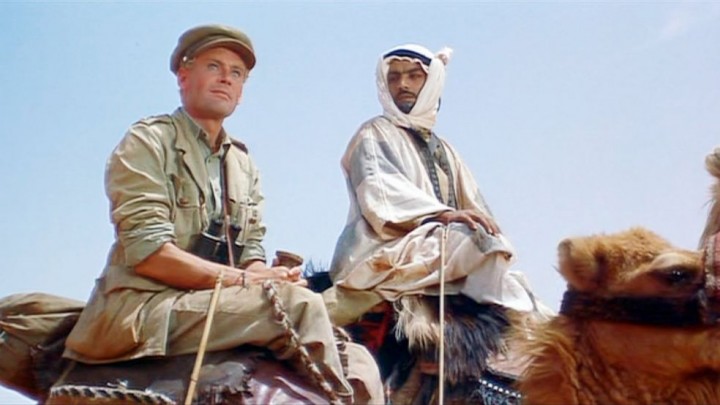
Depicted as historical fact, there are several elements within Lawrence’s framework that are pure fiction, or at least quasi-factual at best. Military personnel are combined into single characters representative of a line of thought or motivation, so too are some Arabian characters, while others are fictionalized altogether. If there’s a single factor in Lawrence’s magnificent production which has caused the most criticism, it’s probably this. The inherent problem with creating totally fictional characters, or condensing multiple characters down into one or two (saving narrative time, in other words, or providing better dramatic trajectory) is that it can act as a falsehood of a kind, giving a film director (or screenwriter) “license” to “make stuff up”, as it were. That’s not to say what Robert Bolt and Michael Wilson have achieved with their sprawling, expansive screenplay is overly fictionalized, but it should be noted that the film does take some liberties with Lawrence as a real historical figure; in saying that, it’s probably to Lawrence’s favour that the film gives him a vastly more square-jawed heroic slant than some felt he had in real life, and while it certainly works cinematically, doesn’t perhaps portray the man with all his known foibles intact. Make no mistake – Lawrence Of Arabia is indeed a complex and intricate film, portraying a man larger than life in a manner that truly equals his life-story, but is it accurate to the events themselves, or does it delve too deep into myth and innuendo? Honestly, it’s probably too hard to sort the fact from fiction these days, so my personal preference is to look upon this film simply as one side of a story that would probably take many days and weeks to tell honestly, were it possible at all.
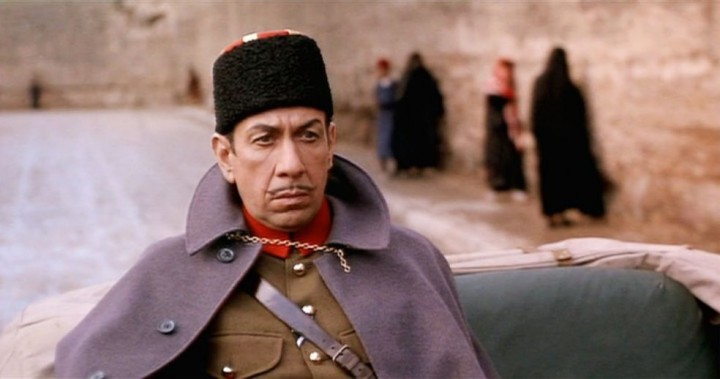
While the film is best known for its superlative cinematography and camerawork (and it still stands up, even by today’s digital-post-processed standards!), it wouldn’t be the success it is without it’s enormous ensemble cast. One of the most astonishing features of Lawrence’s cast is that there are no speaking lines for women – yep, ol’ Lorry is a sausage-fest! Peter O’Toole, as Lawrence, is captivating in his debut feature role – yeah, he’d never done anything on this scale before – those piercing blue eyes and staccato delivery, as well as an unbridled fierce intensity, make his portrayal of Lawrence one of the screens greatest. O’Toole does struggle with Lawrence’s insouciance a little, with a rather unnatural clownish attitude initially making me think the film’s gonna derail right at the open, but as the movie moves into more dramatic circles, O’Toole comes into his own, “grows into the skin” of the character, so to speak, and he elevates the material significantly.
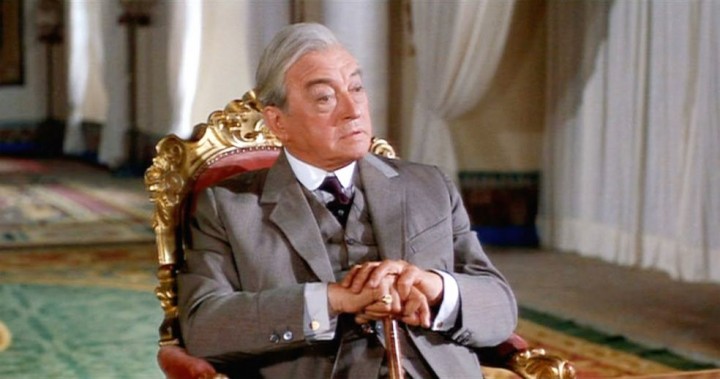
O’Toole is aided in the film by two huge stars – Alec Guinness, doing a 60’s “blackface” and transforming into an Arabian King for the movie (Guinness is one of the most British of Brits, so to see him playing an Arabic character does feel a little forced and almost a parody, something the film skirts with to its detriment at times – it’s a little like watching Peter Sellers’ “asian” performance as Charlie Chan in Murder By Death – that kind of thing would never happen today!), and Omar Sharif, as Sherif Ali, who befriends Lawrence early in the film and becomes one of his staunchest allies. Admittedly, Sharif was not a huge box-office draw for Western audiences, but he was a major star in the Middle East at the time he was cast – and it’s obvious now why he became so; those glowering good looks, soft features and powerfully fierce eyes would make any woman swoon, and any man turn. Both men have effortless screen chemistry, not only singularly but also with their rapport with O’Toole, around whom they spend a great deal of screen-time. Sharif in particular is magnetic here, and it’s a shame his role is minimal in parts of the film because his byplay with O’Toole is so much fun to watch.
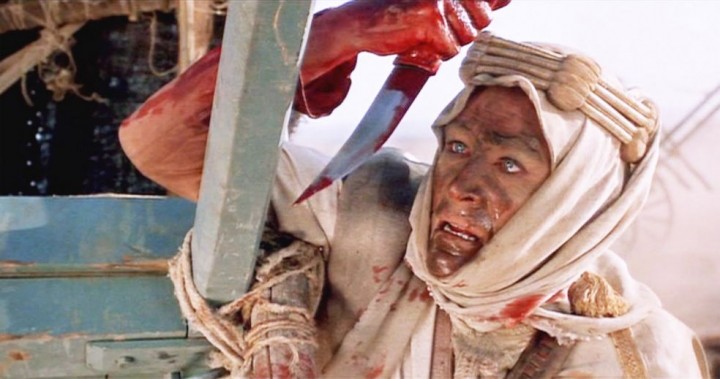
Anthony Quinn, as Auda ibu Tayi, towers across the film like a giant, his brash and bold firebrand sheikh providing plenty of great semi-antagonism throughout the film; Quinn certainly looks better as an Arabian local than Guinness, if comparisons are permitted, and although both actors deliver excellent performances in their scenes together, it’s still somewhat disengaging that the production went with such Anglo-Saxon background actors in key Arabic roles – guess that’s what you did back in Hollywood then, right? Jack Hawkins, as the stiff-upper-lip General Allenby, does a great job, but his role is minimal in terms of dramatic impact and he’s only in the film relatively briefly. Jose Ferrer, as the odious Bey, and Claude Rains, as the machination-heavy Mr Dryden, add their considerable prowess to the film’s cast roster, but have fairly limited roles – although Ferrer’s short-term impact is profound in the back half of the film.
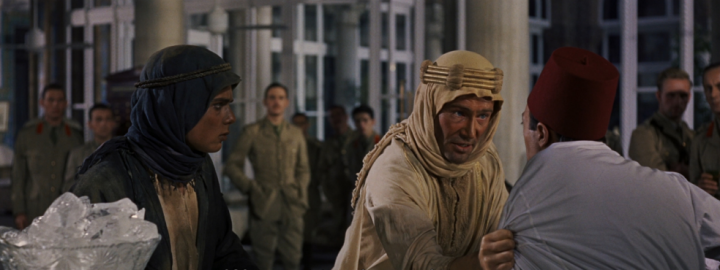
David Lean’s direction in Lawrence is nothing short of astonishing. Marshalling such a wide-screen story, with a large cast and enormously difficult production problems to overcome (who knew filming in a desert was so difficult?), it’s a wonder Lawrence didn’t turn into a complete basket-case. But with his eye on the prize, Lean’s sure hand crafts one of the most amazing screen stories ever told; the mixture of massive vistas and backdrops, supporting the largely intimate character development of a man struggling to find himself within the context of the war effort, makes for compelling viewing. The large-scale battle sequences, in particular the capture of Aqaba, and the final attack on retreating Turkish forces (the famous “No prisoners” scene), are well mounted and thoroughly involving, lacking any form of CGI and actually being filmed “for real” – thousands of extras and stunt performers do the hard yards, and it pays dividends. The film’s authentic, unfiltered feel gives weight to the sense of epic-ness that comes with such a large scale production.
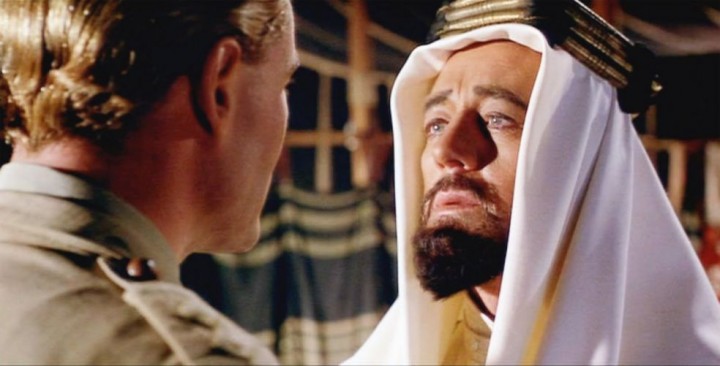
It’s hard to talk about Lawrence Of Arabia without simply devolving into gushing, fanboy praise. The film warrants your time without question; it’s one of those rare movies that genuinely deserves the “classic” status it’s been afforded all these years. The film remains a defining example of everything coming together in perfect alignment/harmony/serendipity – if you’d tried to make Lawrence a classic, you’d have failed, but through the choices and restrictions of David Lean’s direction it ended up becoming one anyway. The film earns its stripes with ease: even by modern cinema standards, this film towers over all comers as a true testament to the power of unfettered storytelling on one of the grandest scales imaginable. Truly, this film is a wonder.

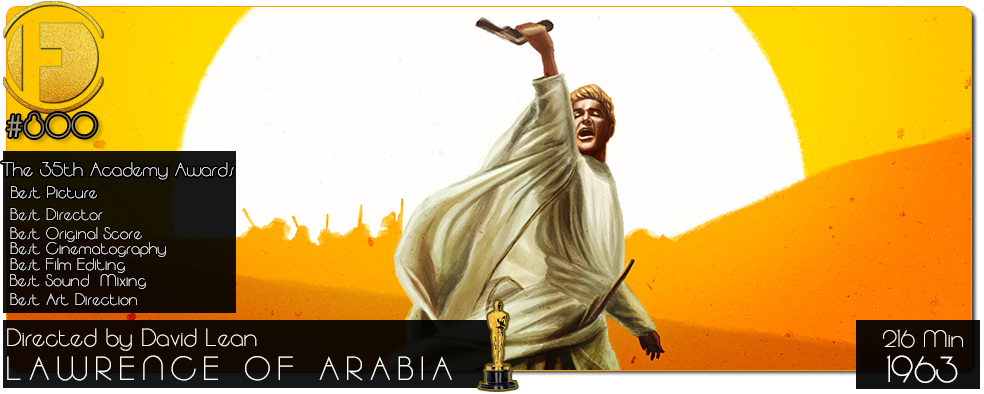
I finally got around to rewatching this. I posted a review on my blog. Anyway, the stuff that bothered me most was the egotism of the protagonist and the racism of the film (Obi Wan Kenobi in brown-face). Overall, it's a way overrated film. You do hit on a lot of reasons why people find this movie to be good, but I think it all comes down to personal taste. There is plenty to dislike in this film, too. It's not a universal classic, that's for sure.
My recent post Attack on Titan Restored My Faith in Anime
Hmm, I read your review and you do touch on a number of salient points – most of which are a result of a more modern appreciation for the film, I think. Approach this film with the contextual points intact – when it was made, the social norms of the time, etc – and you might find it an appreciable better experience. Sure, there\’s touches of racism and Lawrence himself is a bit of a tool at times, but overall I still regard this as a high point in filmmaking, both for David Lean and for Hollywood in general. I guess what I\’m trying to say is that regardless of your leanings for the characters, story or overall theme of the movie, the spectacle and technical prowess on display here is second-to-none, even now.
It's not difficult finding great screenshots from Lawrence of Arabia and that's a perfect one to open the review Rodney! I believe Lawrence of Arabia is Spielberg's favourite film and it is easier to see why (and the influences he took from it). Peter O'Toole is perfect in this film and I always enjoy revisiting his performance. Still, I've yet to see the film in one sitting (watched it three times, usually in two or three sessions).
My recent post Top 10 Movie Train Rides to Avoid
I watched this over two nights to get this review done, and am still utterly blown away by just how magnificent an achievement it is, as both a piece of cinema and as a technical accomplishment. Regardless of what is true or not, it will stand as one of the greatest films ever made, and i don't think anyone could possibly dispute this with any believability.
It's been a million years since I've watched this movie, so I don't have anything to say about it. But I do have this.
You stated, "Much like Citizen Kane, some films defy criticism…"
Well, this means you haven't read my Citizen Kane review. Plenty of criticism to be had: http://awesomelyshitty.wordpress.com/2012/03/04/c…
My recent post The Wind Rises
You should rewatch Lawrence, man. I'd love to hear a "shitty" take on it!! I'll go check out your Kane review in a moment.